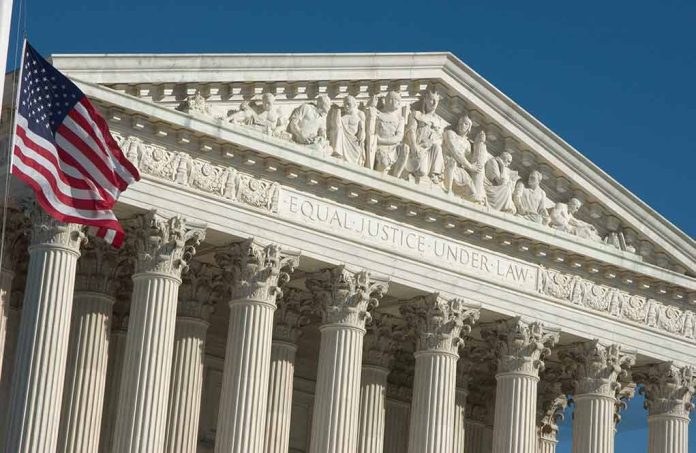
A federal judge in Iowa has ruled that the state can challenge the validity of ballots from potential noncitizens, sparking a heated debate on voter rights and election integrity.
At a Glance
- Federal judge allows Iowa to challenge ballots from potential noncitizens
- Ruling stems from lawsuit by ACLU on behalf of Latino group and recent citizens
- Iowa officials claim about 250 noncitizens are registered to vote
- Decision aims to balance electoral integrity with protecting lawful voter participation
- Critics fear the ruling could disenfranchise recently naturalized citizens
Iowa Court Upholds Ballot Challenges
In a significant ruling, U.S. District Judge Stephen Locher has decided that Iowa can proceed with challenging the validity of ballots from potential noncitizens. The decision comes in response to a lawsuit filed by the American Civil Liberties Union (ACLU) on behalf of an Iowa Latino group and four recently naturalized citizens. This ruling has ignited a fierce debate over the delicate balance between maintaining electoral integrity and safeguarding voting rights.
Iowa’s Republican officials, including Governor Kim Reynolds, argue that this measure is crucial for preventing illegal voting by noncitizens. The state’s process involves using provisional ballots rather than immediately removing voters from the rolls, an approach that aims to address concerns without disenfranchising legitimate voters.
A federal judge ruled Sunday that Iowa can continue challenging the validity of hundreds of ballots from potential noncitizens even though critics said the effort threatens the voting rights of people who’ve recently become U.S. citizens. https://t.co/4CyoudeaYS
— Michelle L. Price (@michellelprice) November 4, 2024
Controversial Data and Concerns
Iowa Secretary of State Paul Pate’s office has identified approximately 2,176 voters whose citizenship status is in question, basing this assessment on data from state transportation records. However, the accuracy of this data has been challenged, with Judge Locher noting that only about 12% of the challenged voters are indeed noncitizens. “It appears to be undisputed that some portion of the names on Secretary Pate’s list are indeed registered voters who are not United States citizens. This portion appears to be relatively small — no more than twelve percent — but, still, the injunctive relief requested by Plaintiffs effectively would force local election officials to permit those individuals to vote.”
This discrepancy has raised concerns about the potential for mistakenly challenging the voting rights of recently naturalized citizens. The ACLU and other advocacy groups argue that the ruling could lead to the disenfranchisement of legitimate voters, particularly those who have recently become U.S. citizens.
Political Reactions and Implications
The ruling has drawn strong reactions from both sides of the political aisle. Republican officials, including Governor Kim Reynolds and Attorney General Brenna Bird, have praised the decision as a victory for election integrity. They argue that these measures are necessary to ensure that only eligible citizens participate in the electoral process.
On the other hand, critics of the ruling, including the ACLU and the League of United Latin American Citizens (LULAC), express deep concern about its potential impact on voter rights. They argue that the decision could create unnecessary barriers for legitimate voters, particularly those who have recently naturalized. These organizations are encouraging naturalized citizens to be prepared to show documentation when voting.
Looking Ahead
The Iowa ruling is likely to have significant implications for voter registration and ballot challenges across the country for the 2024 election. The decision highlights the ongoing tension between efforts to prevent voter fraud and concerns about voter suppression. It also underscores the need for accurate and up-to-date voter registration data to prevent unnecessary challenges to legitimate voters.
While the ruling allows for ballot challenges, it also emphasizes the importance of local election officials exercising independent judgment. This nuanced approach aims to strike a balance between preventing ineligible voting and protecting the rights of all legitimate voters, including recently naturalized citizens. As the debate continues, it remains to be seen how this ruling will impact voter participation and election integrity in Iowa and potentially influence similar cases in other states.
Sources:
Judge rules Iowa can challenge validity of hundreds of ballots from potential noncitizens
Judge Allows Iowa to Challenge Voters It Suspects of Being Noncitizens
Judge upholds state guidance to challenge ballots of potential noncitizens
Biden judge rules that Iowa can check ballots of potential noncitizens in loss for ACLU













